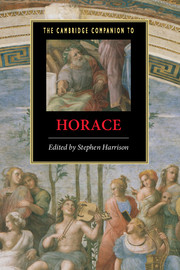Book contents
- Frontmatter
- Introduction
- Part 1: Orientations
- 1 Horace: life and chronology
- 2 Horatian self-representations
- 3 Horace and archaic Greek poetry
- 4 Horace and Hellenistic poetry
- 5 Horace and Roman literary history
- 6 Horace and Augustus
- Part 2: Poetic Genres
- Part 3: Poetic Themes
- Part 4: Receptions
- Dateline of works and major political events
- Works cited
- Index
6 - Horace and Augustus
from Part 1: - Orientations
Published online by Cambridge University Press: 28 May 2007
- Frontmatter
- Introduction
- Part 1: Orientations
- 1 Horace: life and chronology
- 2 Horatian self-representations
- 3 Horace and archaic Greek poetry
- 4 Horace and Hellenistic poetry
- 5 Horace and Roman literary history
- 6 Horace and Augustus
- Part 2: Poetic Genres
- Part 3: Poetic Themes
- Part 4: Receptions
- Dateline of works and major political events
- Works cited
- Index
Summary
Given the conspicuous role Augustus plays in Roman poetry from the advent of his power as the young Caesar in the 30s bce to his death, it is easy to forget the novelty of this feature. No single figure so dominates Republican literature. With virtual monarchy comes a tremendous literary focus. Horace offers a unique opportunity for examining a poetic response to this concentration of power because his oeuvre spans three decades and a multitude of genres. He consistently aims to define his place in this new society, whether as an apolitical individual, or as a poet with a public role. Horace speaks from each genre as an 'I' who is both no-one socially, and a member of the inner circle, though the relative proportion of these positions tilts more to the latter as time advances. Horace’s paradoxical status answers to the new possibilities for being a subject and for being a poet under Augustus.
From his earliest to his latest writings, Horace is increasingly preoccupied with the first man in the state. Although Horace fought on the losing side as a military tribune at Philippi, with the start of his poetic career he appears allied to the Augustan camp, whether directly or indirectly through his patron Maecenas. He has been celebrated and condemned as a 'spokesman' for the Augustan programme; he has been exonerated from such commitment as an ironist in an Epicurean vein; it is fiercely debated whether his poetic warnings to the princeps constitute praise or blame.
- Type
- Chapter
- Information
- The Cambridge Companion to Horace , pp. 77 - 90Publisher: Cambridge University PressPrint publication year: 2007
- 9
- Cited by

